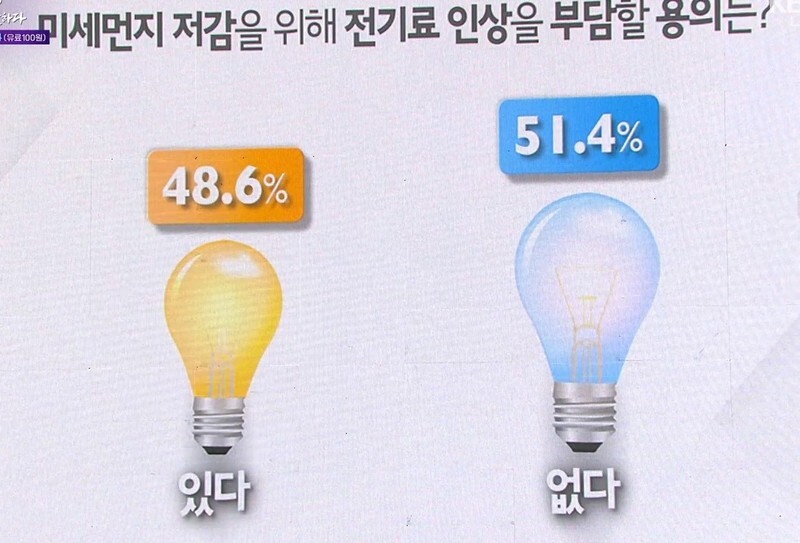hankyoreh
Links to other country sites 다른 나라 사이트 링크
Over half of S. Koreans unwilling to pay increased electricity fees to fight fine particle pollution

Over half of South Koreans said they would not pay increased electricity charges to combat fine particle dust.
The same survey findings showed respondents supporting the full-scale implementation of an odd- even-numbered driving day system to slightly outnumber those opposing it.
The results from a survey of citizen perceptions were announced at a live broadcast roundtable discussion titled “New Pan-National Meeting: Talking about a Solution to Fine Dust” held on June 9 by the National Climate and Environment Council in conjunction with the KBS network. For the survey, a total of 2,602 adult residents of South Korea’s 17 metropolitan cities and provinces aged 19 and older were questioned by the KBS Public Media Institute between May 9 and June 3.
When asked about their willingness to pay increased electricity charges if coal-fired thermal power plant use is discontinued to reduce fine particle dust, 51.4% of respondents said they were “unwilling,” while 48.6% said they were “willing.” Meanwhile, support for full-scale implementation of an odd-/even-numbered driving day system slightly outweighed opposition by a margin of 49.4% to 43.5%. The results indicate that South Koreans are opposed to higher electricity fees but may accept adoption of alternating vehicle days.
The South Korean government’s measures in response to fine dust were rated as “inadequate” by 75.3% of respondents. In terms of the effects of emergency reduction measures such as odd-/even-numbered driving days for public institutions and bans on the unit of outdated vehicles, a plurality of 39.7% of respondents described them as “generally helpful,” while 37.3% judged them “not helpful.” Over half of respondents (54.4%) said the most effective approach would be a “solution based on diplomatic cooperation with China.” Other approaches included adjusting the operating rates for facilities emitting pollutants into the atmosphere (19.2%), using new technologies such as artificial rain (10.2%), discontinuing the use of coal-fired thermal power plants (7.7%), and increasing the convenience of public transportation (4.8%).
The survey was conducted by internet questionnaire based on responses from emails to 31,422 individuals (2,602 responses, 8.28% response rate). The sampling error was ±1.92 percentage points with a 95% confidence level.
By Park Ki-yong, staff reporter
Please direct comments or questions to [english@hani.co.kr]

Editorial・opinion
![[Guest essay] Preventing Korean Peninsula from becoming front line of new cold war [Guest essay] Preventing Korean Peninsula from becoming front line of new cold war](https://flexible.img.hani.co.kr/flexible/normal/500/300/imgdb/original/2024/0507/7217150679227807.jpg) [Guest essay] Preventing Korean Peninsula from becoming front line of new cold war
[Guest essay] Preventing Korean Peninsula from becoming front line of new cold war![[Column] The state is back — but is it in business? [Column] The state is back — but is it in business?](https://flexible.img.hani.co.kr/flexible/normal/500/300/imgdb/original/2024/0506/8217149564092725.jpg) [Column] The state is back — but is it in business?
[Column] The state is back — but is it in business?- [Column] Life on our Trisolaris
- [Editorial] Penalties for airing allegations against Korea’s first lady endanger free press
- [Editorial] Yoon must halt procurement of SM-3 interceptor missiles
- [Guest essay] Maybe Korea’s rapid population decline is an opportunity, not a crisis
- [Column] Can Yoon steer diplomacy with Russia, China back on track?
- [Column] Season 2 of special prosecutor probe may be coming to Korea soon
- [Column] Park Geun-hye déjà vu in Yoon Suk-yeol
- [Editorial] New weight of N. Korea’s nuclear threats makes dialogue all the more urgent
Most viewed articles
- 1[Guest essay] Preventing Korean Peninsula from becoming front line of new cold war
- 260% of young Koreans see no need to have kids after marriage
- 3Yoon’s broken-compass diplomacy is steering Korea into serving US, Japanese interests
- 4After 2 years in office, Yoon’s promises of fairness, common sense ring hollow
- 5[Column] Why Korea’s hard right is fated to lose
- 6S. Korean first lady likely to face questioning by prosecutors over Dior handbag scandal
- 7Is Japan about to snatch control of Line messenger from Korea’s Naver?
- 8[Column] The state is back — but is it in business?
- 946% of cases of violence against women in Korea perpetrated by intimate partner, study finds
- 10[Column] The first year of war in Ukraine